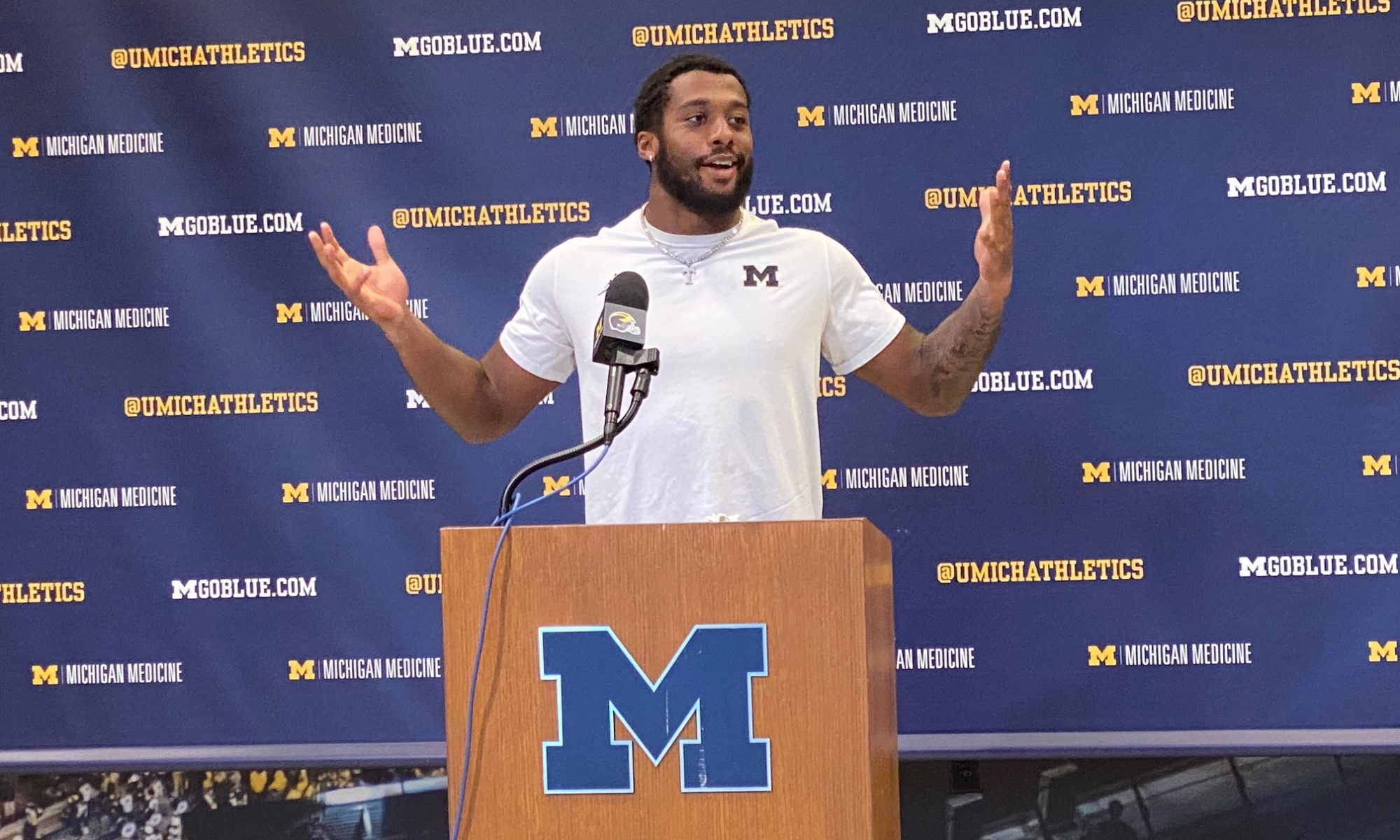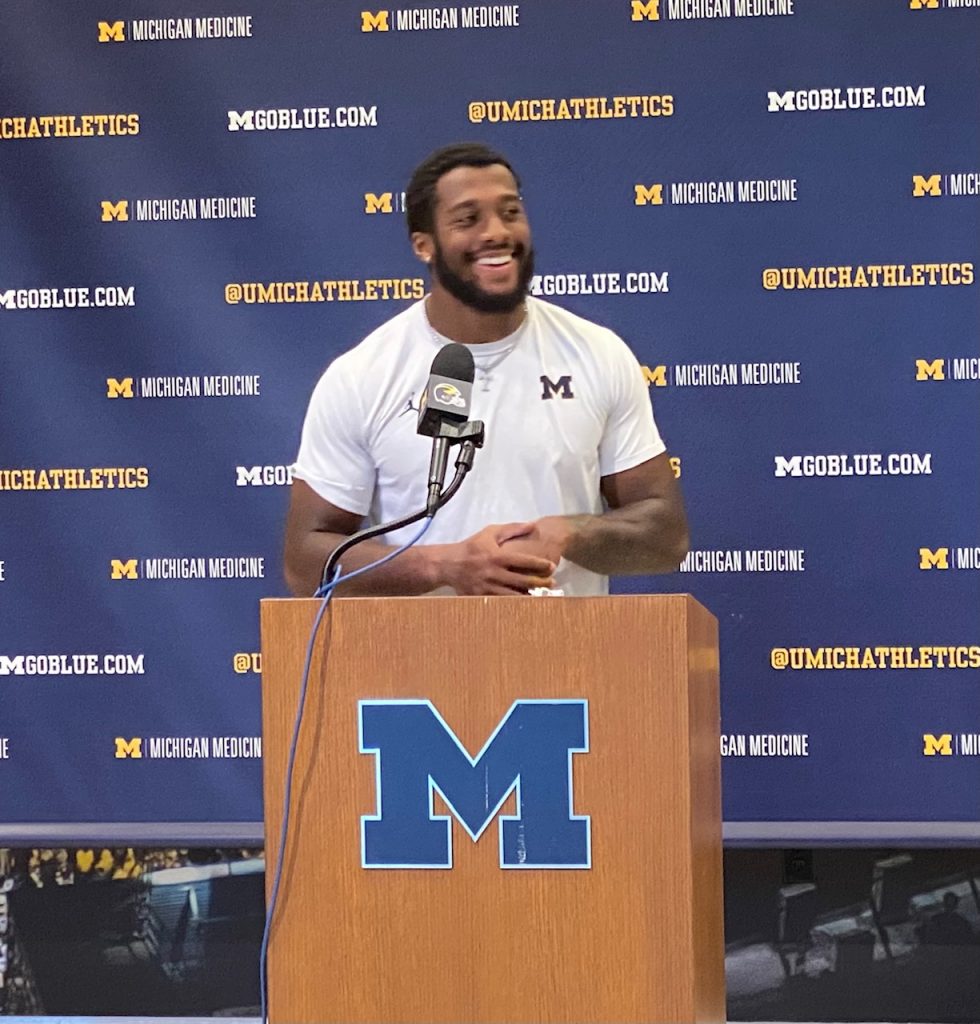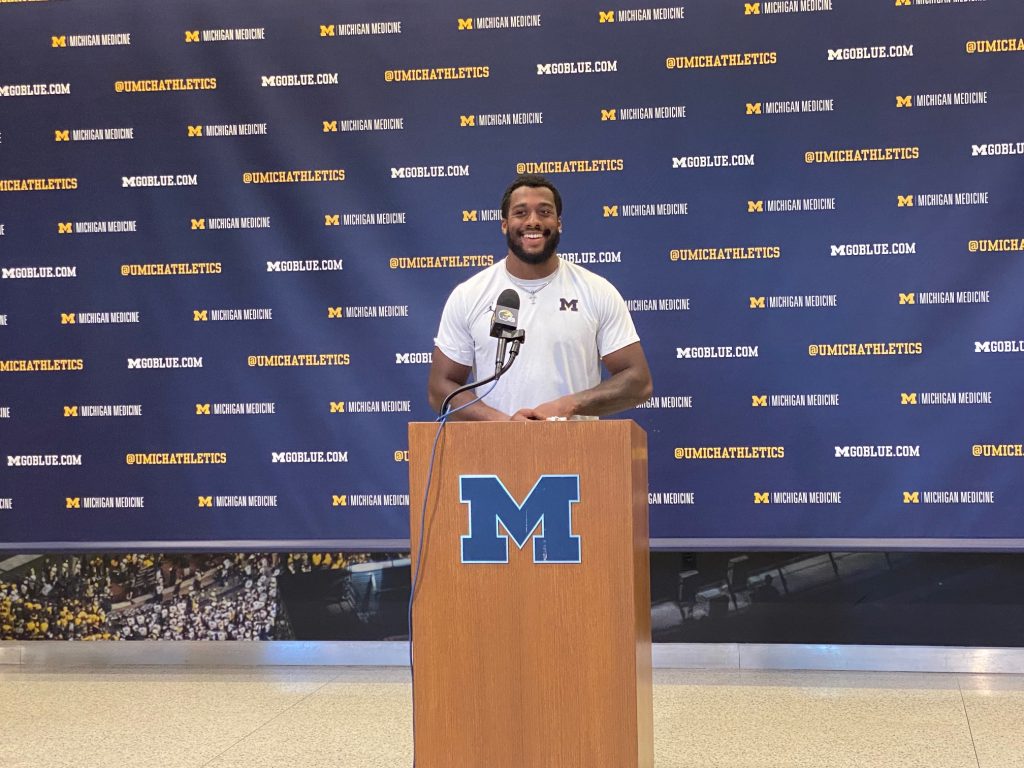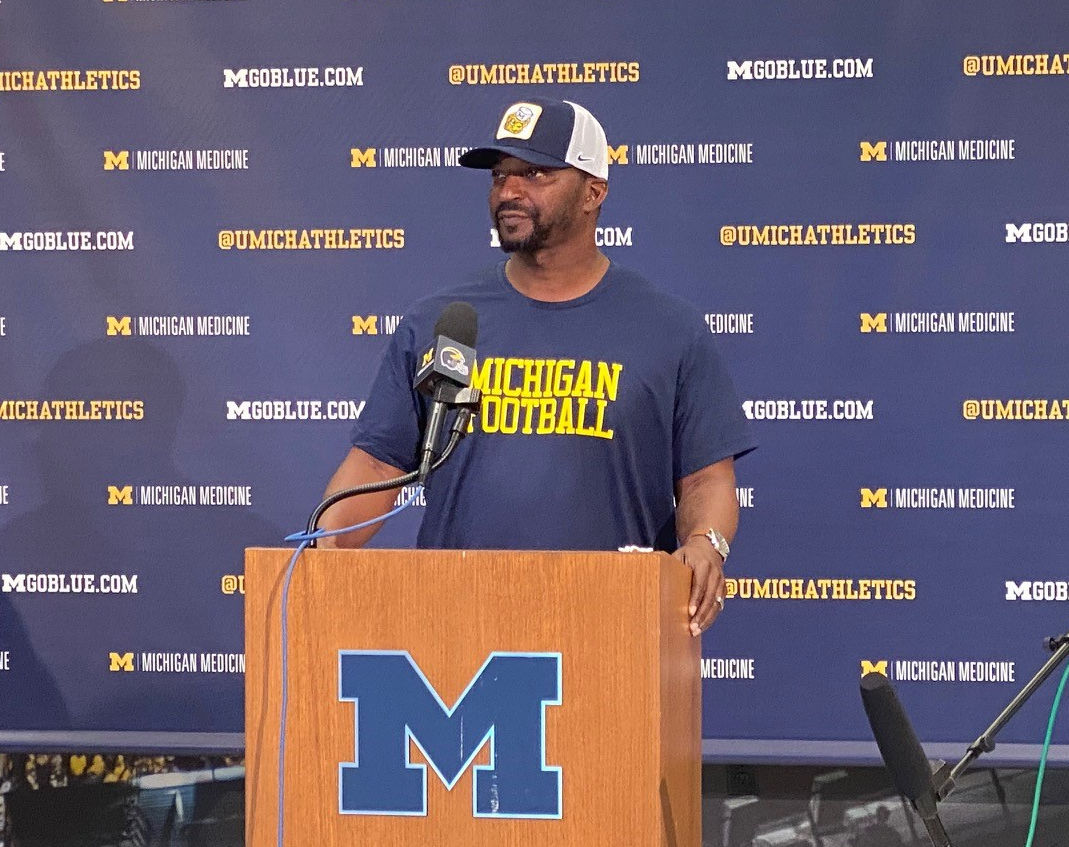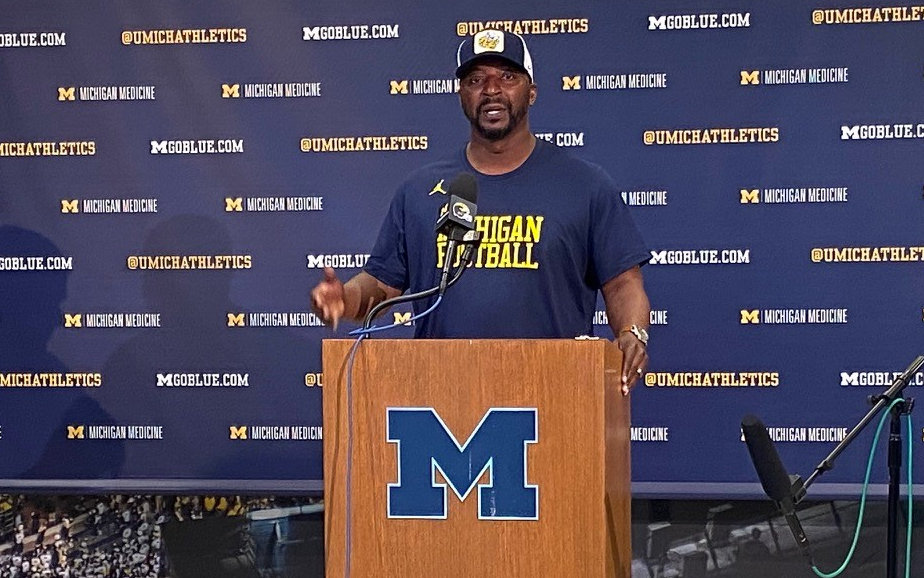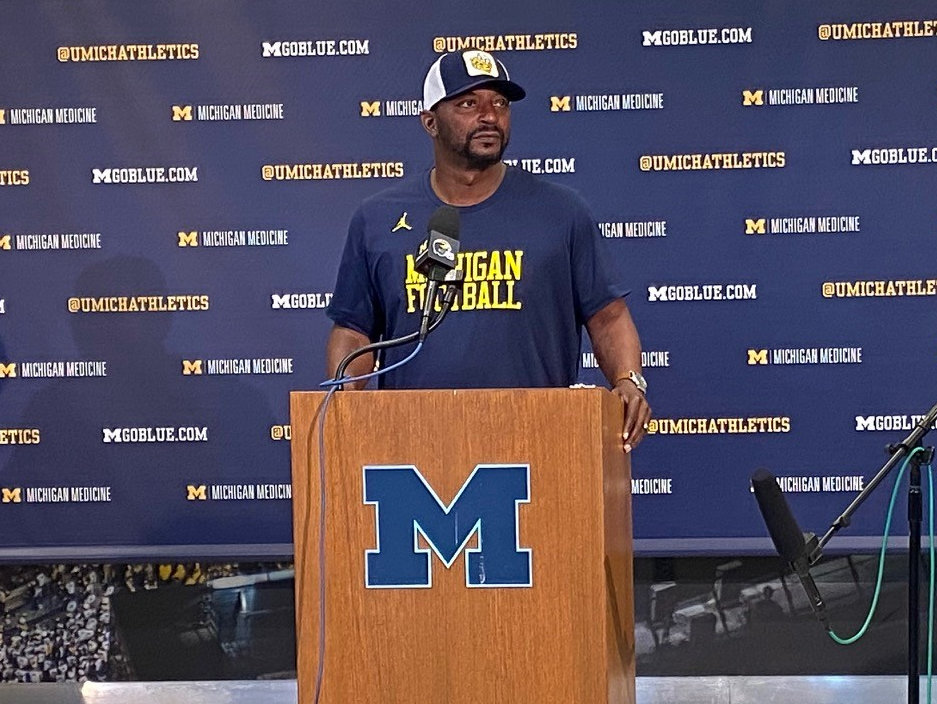Availability 8/11/22
Q:
We’ve heard some of the players say, both offense and defense, stuff about Mazi’s leadership then Luke Schoonmaker was talking about how when they line up against your defense everyone’s communicating, that everyone’s screaming at each other…What brought that about that seeing that entire group become more cohesive in that light?

Minter:
I think, you know, we always have said a loud defense is a good defense.
One of our pillars of our defense is obnoxious communication…a lot of our calls, it might be rotation of coverage, it might be where’s the pressure coming from, it might even be just hey, they’re lined up like this, alert for this.
I think our group has just bought into that being a foundation of how we want to play defense…they started to do that but as they continue in the second year and have a lot of carryover, it allows them to do that with a lot of confidence. The more confidence you have, the louder you communicate. So when you look at the younger guys, sometimes it’s quieter, it’s not as goo and so the more that the more of those guys gain confidence…knowing what their assignment is, knowing what they’re doing, the louder it becomes.
Q:
Jim has called this defense and the no star defense how does that manifest in practice?
Minter:
One of the things we’ve talked about is, you know, we’re not worried about replacing whoever, you know, there are certainly some really, really good players.
We want to have the best 11 players on the field for the given situation that’s occurring. When our guys buy into that, and they play really hard, they’re not worried about who makes the play. When somebody makes a play, we all make a play. You know, I’ve been very, very pleased and just the mentality in that regard. They also we’re going to move people around, we’re going to try to create matchups given the opponent.
And I look at it like this, whatever it looks like going into the year, I hope we have a bunch of stars at the end of the season.

Q:
Sacks are not everything and a team effort to get a sack but at the end of the year, who are a few guys that you think will be at the top of the sack list?
Minter:
I hope that that it’s multiple guys. I think we have some edge players, Mike Morris, Braiden McGregor, Taylor Upshaw, Jaylen Harrell, that have the capabilities of being good rushers, I think Chris Jenkins, Mazi Smith have the ability to push from inside, I think Mason Graham, Cam Goode, a new guy, has all these guys have capabilities of being good rushers. It’ll fall into situationally who we have out there.
They’re all capable of taking advantage of opportunities, I think it’s our job to just make sure we try to put each guy in the best position to have that success. And then the other thing is, because it might not be one guy, it’s, it’s given us the ability to maybe move people around more, maybe a guy that rushes a lot, one week drops the next week, and it sort of changes our tendencies. So I think the guys are really bought into that. We wantto have a high total at the end of the year but you know, we’d love for it to be a lot of different people with multiple sacks.
Q:
Kind of on the flip side of that who was some of those edge guys that are doing pretty well in coverage and it that drop stuff in rushing the passer?
Minter:
You know, I think all those guys as they’ve learned a second year, as we’ve progressed, they understand how to drop now. And you know, I think when you when you talk about edge position, it’s like, can you rush the passer? Can you set the edge? And then can he be in the right spot, we asked him to drop?
We don’t want to put them in bad situations where they could be in a bad matchup. But it’s like a lot of times, maybe a simulated pressure or something to where we’re asking him to cover a quick throw, really just be in the right spot. Don’t screw it up. Don’t overthink it. All those guys have done a really good job of going into second year of understanding where they need to be
Q:
Jesse, obviously every every situation is different. How much of what you did last year at Vanderbilt carries over to what you doing here and how much of that was kind of specific to the team, personnel, and the league that you were in there?
Minter:
Yeah, I think every every situation is its own. You know, the system we ran at Vanderbilt was built for Vanderbilt. You know, we had a defensive head coach, we put some stuff together but based off of both of our past histories. So honestly not not a lot of terminology carryover certainly like there’s there’s only so many structures of defense you can play. So there were some things we did that probably look the same but now it’s kind of back into the system we had built in Baltimore from a terminology standpoint.
There’s carryover and how you play defense and what’s important to play good defense. But, you know, definitely probably two different systems.
Q:
Is there some comfort for you coming back into that system that you know, really well?
Minter:
Absolutely. Coach Lee and I at Vandy had built it together, I said, hey, paint me a picture of what you want the defense to look like. So then we were able to put it together. Here, you know, it was same, same conversation- Coach Harbaugh, paint me a picture of what you want the defense to look like from your perspective as the head coach? Okay, now let’s get our paint brushes out so we can make it happen.
Q:
Besides Junior Colson, what is your linebacker group? How has that kind of coalesced?
Minter:
I think Junior’s having a really good camp so far growing understanding of what we expect. I think Nikhai is having a really good camp. I think Michael Barrett is having a really good camp. Kalel, as you guys have heard is splitting time. He’s doing well a linebacker, he’s a guy that can probably have roles on both sides…the two freshmen that neither one were early enrollees Jimmy Rolder and Deuce Spurlock, I think they have flashed, and you can tell why they were recruited here, they certainly have a lot on their plate of learning but I’m pretty pleased with that group right now.
Q:
At Big 10 media days, DJ Turner almost was sort of laughing at how similar he thought you and Coach McDonald were. Do you agree with that assessment? And what are what are some similarities and differences between you guys?

Minter:
You know, people said that about us, when we were in Baltimore that we were just similar. There was a time where he was in the DB room, and then he moved to the linebackers. And I moved into the DB room. I think I think we both look at the game similar.
We both have probably a fairly calm demeanor about us, that allows us to stay in the moment and not not kind of ride the wave of emotion.
But, you know, some, we’re different people, you know, and we look at the game different times, like he had moved to the linebackers, he might have looked at things a little more front to back, as a DB coach, my whole career pretty much kind of see things from the back to the front. And know, so there’s definitely similarities, you know, but I think we’re two different people as well.
Q:
So obviously, there’s a quarterback competition and those two quarterbacks are pretty different. JJ with the legs, Cade more so in the pocket, how much does that help your defense to see both of those looks? And how might that prepare you for the season? Given that you’ll see two different kinds of quarterbacks each practice?
Minter:
Yeah, I think they’re, you know, it’s not my job to evaluate them, but they’re both exceptional players.
I think one of the things about Cade is I think he’s actually more athletic than maybe people talk about he moves around really well in the pocket. JJ can certainly take off and, and make plays, but you know, they’re both really good. They both present different challenges.

We talk to our edge guys about which one is in there sort of how to rush different versus those types of quarterbacks. So it’s great work in that regard of having to recognize some teams might play two quarterbacks where you got to recognize how we rush one guy a certain way. One guy you might not mind if he gets out, one guy you definitely want to keep in the pocket.

So tremendous opportunity for us to go against not only those two, but our entire offense. Coach Weiss, Coach Moore, Coach Harbaugh- some tremendous talent over there, tremendous scheme that we get to go against. So it’s a blessing for us to try to get better every day.

Q:
You already have this under your belt having called plays last year at Vanderbilt. How difficult is it going into a first season? Not having done that before and helped? How much more comfortable are you now calling plays?
Minter:
I called plays for six years before I went to Baltimore as well. So I have a lot of confidence in myself in the regard of just staying in the moment, I think. I remember, as a first time play caller of 2011, I was young and you sort of ride the emotion of the game at times when you first start and I think it’s the ability to sort of take yourself out of the good and bad focus on the next play.
Just like you want the defensive players to have the next play mentality. I think as a play caller, the more you do it, the more you sort of understand like, you know, one play is not gonna make the difference. So it’s putting the guys in the best position every play and not being emotional. I think sometimes play callers can be emotional with a response and sometimes that’s not the best thing for that situation. So I’m confident my ability to do that.
Q:
Have you ever been emotional in your response?
Minter:
Absolutely. I think the more you do it, the more you sort of figure that out. My demeanor over the years has changed, probably to be calmer. So, you know, it’s definitely something that I focus on.
Q:
Jesse, can you talk about Mazi Smith, your first impressions of him, how that assessment has evolved, now, since you’ve had a chance to work with him for a while?

Minter:
He’s a freak, I think there’s a list that came out that, you know, he was number one in the whole country. The thing that I enjoy the most about Mazi is just how good he wants to be. He works really hard. He studies film. He’s very meticulous in his technique. He’s meticulous in how he trains, huge credit to our strength staff for not only with Mazi, but what they’ve done with our whole team.
He’s just a humble, really hard worker knows he has some ability, but wants to be really, really good. He wants to expand on his role from a year ago, you know, that was like one of our first conversations was, hey, we’ve lost this stuff and he wants to be on the field more. He averaged 41 snaps a game last year. I don’t know what the number will be but any critical situation in the game, when we have Mazi out there, we’ll have a great opportunity.
Q:
Last season Ojabo and Hutchinson had, like 73% of the sacks, how much [of replacing] that will be democratic? It sounds like from the players that essentially that they feel like it’s a an eleven man defense. How much do you think that’s going to be spread out, how much have you schemed that out going forward?

Minter:
With the sort of the inexperience in game situations with our edge, guys, I think it’ll play itself out. Because, yeah, we’ll certainly scheme things up, move people around, pressure, different people try to get other guys involved in pressure.
But at the same time, you know, if one of those guys just emerges as a great one-on-one rusher, then it’s our job to continue to put him in the situations to be a one-on-one rusher. So, you know would I love for one guy to have 19 sacks at the end of the year? Absolutely. You know, but I just don’t know yet…A lot of these guys haven’t rushed the passer consistently in live situations. I think that’ll sort itself out, especially over the first couple games of the year.
Q:
They also said that basically now it’s just kind of building on the concepts of last year, where do you see this defense maybe taking the next step?
Minter:
It’s just a level of comfort that they have within what we’re trying to do. There’s things that we’ll do a little different, there’s things that we might do more of, there’s schematic things that we may have added. I’ll try to let the first few opponents figure that out.
Q:
Kenneth Grant was also on that freaks list, where is his development and what what makes him such a freak?
Minter:
He’s Mazi’s Jr. First and foremost, because of his attitude, very, very humble, very, very detailed. And his approach which is extremely unique. For a freshman that that wasn’t here in the spring. He’s taken to everything Coach Elston has tried to teach him and get him to do at a very impressive level for a young player. Same thing in the weight room.
Over the course of June and July, like you could sort of see him transform and take exactly what Coach Herb and the staff wanted him to do. And then on top of that, he’s extremely gifted he’s, he’s a 350 plus pound human being that moves really well, that is really, really strong, naturally.
And some of the things that we test those guys in I mean, it’s pretty freakish to watch him go off the plyo steps or move laterally move side-to-side. So blessed that we have him and I think he’s got a really, really high ceiling.
Q:
You talked about being in the moment as a play caller. Do you spread that message to the players about being in the moment not during the game during practice and what kind of message and how does that process go?
Minter:
Yeah, 100% I think I think great defenses [have a] next play mentality.
You can gain momentum as a defense and that’s good to use, you know, make a good play, everybody gets excited, you make another good play, you keep that energy up. The really, really good defenses that I’ve been around that I’ve watched that I’ve studied, it’s what happens when a bad play happens. How do they respond? I’ve been pleased with how we’ve responded at times in practice.
It’s just a mentality of, you know, it’s always the next play is the most important play. And the way I always looked at it, as, you know, when you go back and watch games, everybody’s always like, hey, there’s these five or six plays made the difference, good or bad. The thing is, you don’t know what five or six plays those are as the game is occurring. It’s important to just play the next play, lock in.
You know, especially as an old secondary coach, like, hey, guys gotta give up a catch. It’s how do you respond? How do you come back and play? How do you stay locked in every play?
So I think the guys have done a good job of sort of embracing that mentality. And hopefully we can carry it carried over…we will face adversity, you know, and so it’s how do you handle adversity? How do you handle it look at last year and study what happened and it’s the first drive of the season, they go down and score a touchdown. Well, they responded really well, you know, so at some point over the first month of the year, we’ll be in some adverse situations, and I’ll be anxious to see how we respond.
Edits made for clarity.


